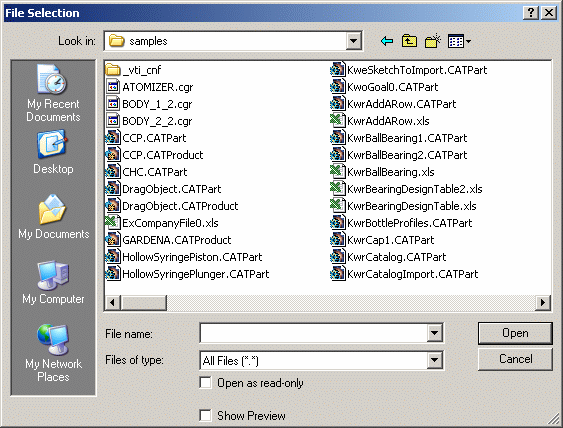What you should know before you start
- Dassault Systèmes guarantees upward compatibility for Version 5 data
- As far as downward compatibility is concerned, Version 5 data can be reused from one service pack to another, provided that they belong to the same release. If the Version 5 data does not belong to the same release, they can still be reused in case of .CATPart documents but this implies the use of a specific process detailed in Using the Version 5 Compatibility Batch
- You cannot open a document created using Version 5 if its name contains national characters or forbidden special characters. For a reminder, refer to About Filenames
- When a .CATPart document containing a Sheet Metal Design feature is open on a configuration level (i.e. P1, P2 or P3) lower than the level on which the feature was created, all the icons of all the workbenches available in your configuration are grayed out. This may also occur when working with Generative Shape Design or Part Design features.
Accessing V4 data
To access V4 data such as V4 models, PROJECT files and library objects on Windows or UNIX or access CDMA objects on UNIX, you can do so provided that you purchase the V4 Integration product.
V4 models, PROJECT files or library objects residing on UNIX can be accessed from Windows using the http protocol. Make sure beforehand that an http server has been installed on the computer where the V4 data resides.
The address to be specified can be something like this:
http://UNIXserver: port/V4datalocation
Using File > Open
-
Click Open
 in the Standard toolbar or select File > Open (or
press CTRL+O).
in the Standard toolbar or select File > Open (or
press CTRL+O).The File Selection dialog box appears: 

Depending on the document environments you allowed in the Document settings, an additional window might appear simultaneously to let you access your documents using an alternate method. For detailed information, refer to Opening Existing Documents Using the Browse Window. -
In the File Selection dialog box, select the file location.
-
Click the Files of type: list.
-
Select the document type.
-
If you are sure you do not intend to modify the document in any way you may want to open the document in read-only mode. If so, select the Open as read-only check box.
-
Click Open. A document appears.
![]()
Using the Insert > Existing Component... Command
This command is only available in DMU Navigator. Refer to "Setting
Up Your Session" and "Inserting
Components" in the Version 5 - DMU Navigator User's
Guide.
![]()
Using the Open in New Window Contextual Command
-
If a document is already open in a Version 5 session, select the item you wish to open from the specification tree.
-
Right-click then select xxx object > Open in New Window.
The document associated to the selected item is opened in a new window.
More about the Open in New Window command
- In CATIA V5, each window is associated to a document. As far as volatile documents are concerned, they cannot be opened using Open in New Window (an error message is issued). For instance, you cannot open in a new CATIA V5 window a Product Root Class created in ENOVIA V5 because a "PRC" is an ENOVIA V5 concept which has no equivalent in CATIA V5
- If you modify a document open in a new window then decide not to save
the modification when closing the new window, this does not imply that
the modification will not appear in the parent window: it only means that
the document will not be saved at the end of the session.
The reason is that the modification you made has been loaded in memory. Therefore, after closing the new window, the only way to restore the document in the parent window is to use the Undo command.
![]()
Using the Open the Pointed Document Contextual Command
-
If a document is already open in a Version 5 session, select the item pointing to a
referenced document from the specification tree.
This command is available for geometrical external references and external parameters only.
For instance, you can use this command when selecting a geometry pasted "As Result With Link" in a CATPart document different from the one in which it has been copied (the geometry is identified by the following symbol: ).
). -
Right-click then select xxx object > Open the Pointed Document.
The document pointed to by the selected item is opened in a new window.
![]()